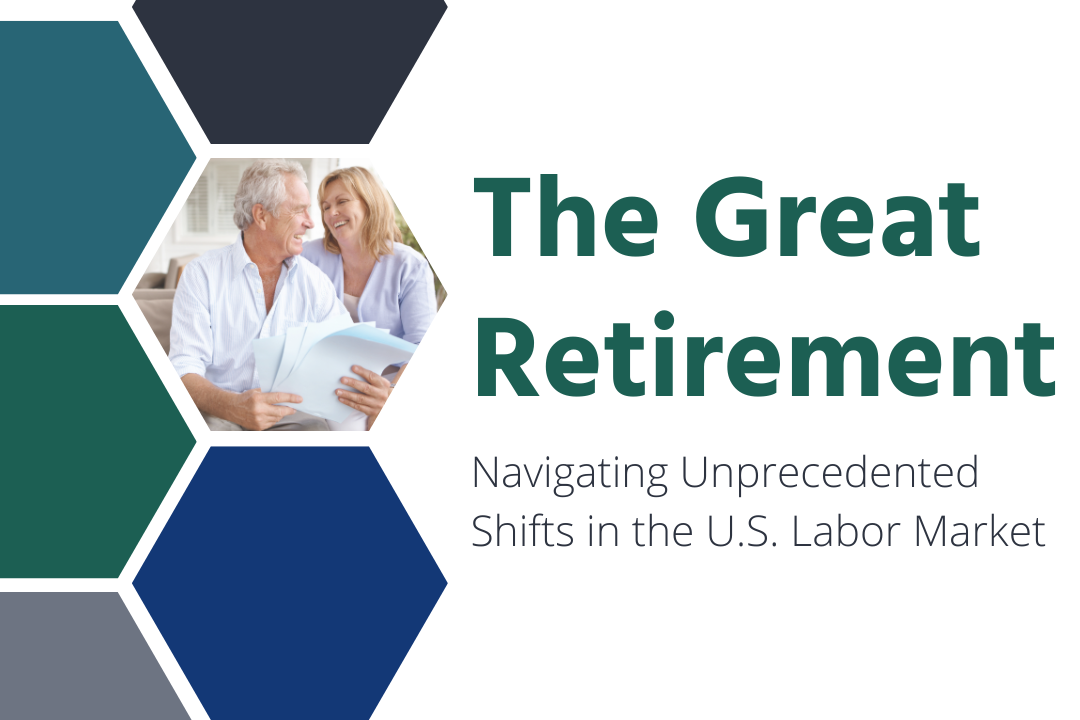The Great Retirement
Introduction
The recent phenomenon of the “Great Retirement” in the U.S. presents a notable shift in the labor market. The Covid-19 pandemic triggered an unexpected increase in the number of retirees- something that may be impacting you or your loved ones.
This shift is primarily due to:
- older workers choosing retirement to avoid the health risks associated with continued employment,
- companies offering early retirement packages as a cost-cutting measure,
- in some cases, a preference for retirement over adapting to new work models such as remote work.
Impact
Ultimately, the long-term implications of the pandemic are unclear. The changes in the labor market reflect a deeper reassessment of work-life balance and retirement decisions among Baby Boomers especially, but also other generations who are planning for future retirement.
For those of us still in the labor market, the increased number of retirees has implications for us and the broader economy:
- Labor shortages: certain sectors may experience labor shortages, possibly improving job opportunities and wages for younger generations.
- Increased workload: those remaining in the workforce might face increased workloads and responsibilities to compensate for the reduced workforce which could lead to higher stress and burnout of those employees.
- Shift in skills: as older workers retire, there will be a loss of experienced, skilled labor. As a result, companies may need to invest more in training and development for existing employees to fill this increasing gap.
- Intergenerational wealth transfer: the retirement of a large segment of the population could accelerate the transfer of wealth to younger generations.
- Social Security and pension systems: more retirees and lower workforce participation will put increased strain on Social Security systems and pension funds, potentially leading to reforms or changes in retirement benefits.
- Healthcare and social services: a larger aging population may demand more healthcare and social services, which will impact public spending and require more workers in these sectors.
Insights
For those 65 and older, several behavioral finance insights are relevant, but three are of primary interest: the wealth effect, happiness, and social dynamics.
The Wealth Effect
The wealth effect refers to the psychological phenomenon where people spend more as the value of their assets rises (which many saw happen during the pandemic). Most of us will be unaware of this and it stresses the importance of having a long-term financial plan that remains stable in the face of short-term market fluctuations.
Happiness
Understanding what makes us happy can play a large role in our choices. Given that the pandemic led many to reassess their priorities in life, understanding what may be driving our decisions is important to ensure we achieve their financial goals (whether new, revised, or existing).
Many of us underestimate the context in which experiences occur due to something called hedonic adaptation whereby people adapt to their new circumstances incredibly quickly. As a result, individuals may think that retirement will bring them more happiness than it actually will as they quickly adjust to their new norm. Taking stock of your motivations and weighing your personal pros and cons to continuing work vs. what your new day-to-day will be like is important when making the decision to retire. Performing experience sampling—asking people who are retired how they feel and what their day-to-day looks like—can help with some of the biases involved with predicting happiness.
Social Dynamics
Some of us may be adversely affected by social influence when deciding to retire or how to behave during retirement. Retiring because our friends are, or we think society expects it of us at a certain age, may not be the right financial decision at that time for us. For so-cial comparisons, it can be important to see cold, hard facts: by the age of 65 approxi-mately 50% of Americans are still working, and even at the age of 69, 30% are not retired. When considering retirement or a change in financial plans to go through their financial plans and situation in detail. This can serve as a “reality check” that counters social factors.
Conclusion
Overall, the Great Retirement has and will continue to have significant impacts, both positive and negative, on the U.S. economy and population.
Copyright © 2024 Atlas Point LLC, All rights reserved.
